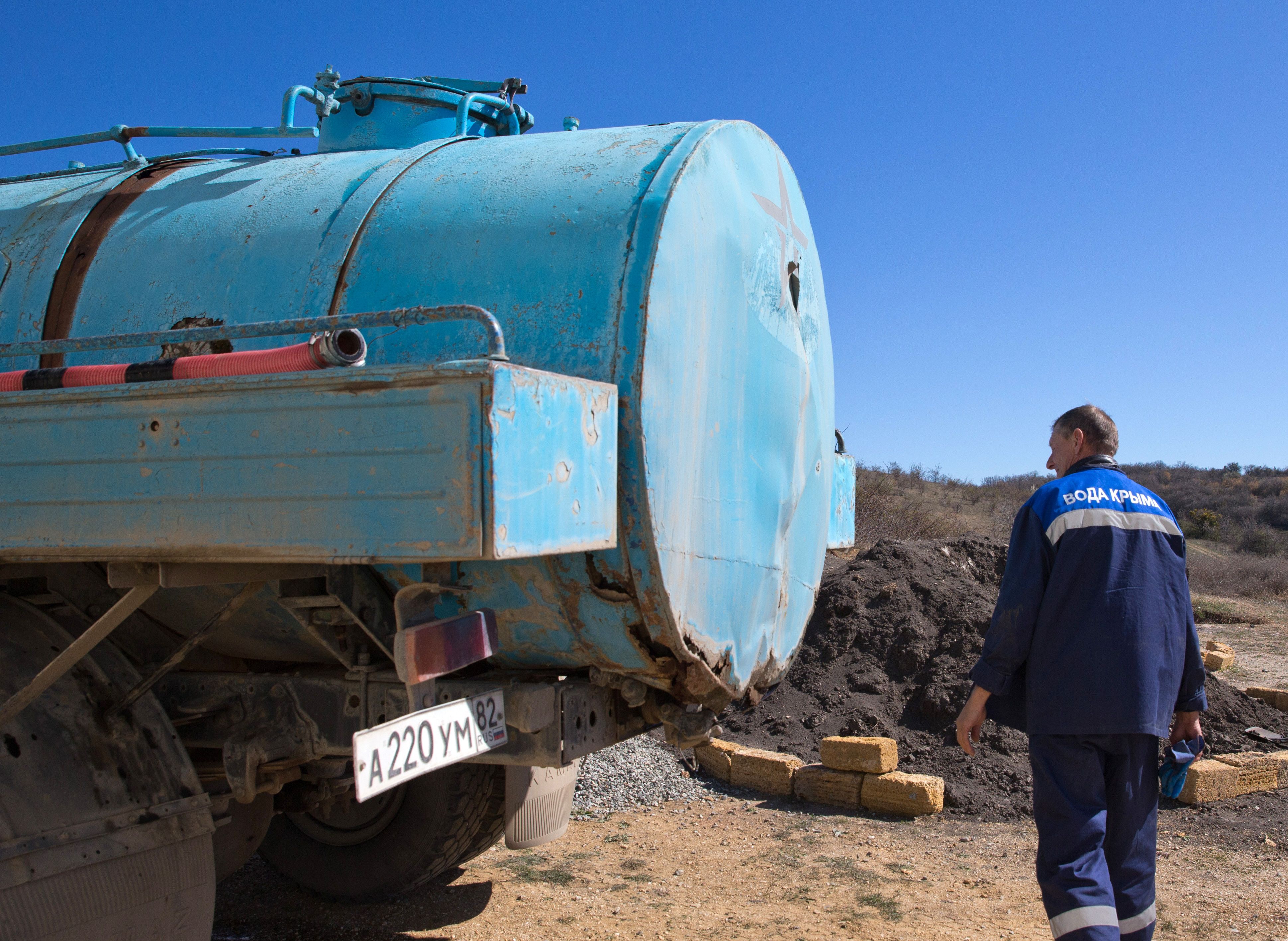Water Shortages in Occupied Crimea

Water Shortages
At the turn of August to September, water rationing was introduced in parts of the Crimean Peninsula. The most severe restrictions were imposed in Crimea’s capital, Simferopol, a city of more than 300,000 people, and the surrounding settlements where the water supply system works for just six hours a day. In mid-October, due to a shortage of fresh water, a “state of increased readiness” was introduced in Sevastopol and its 450,000 population. That city’s authorities estimate that, in the worst-case scenario, they will run out of water as soon as the end of the year. The peninsula has suffered from a chronic water deficit since the Russian annexation in 2014 when Ukraine dammed the North Crimean Canal—diverting part of the Dnipro River (Dnieper)—through which Crimea received up to 85% of its water. Agriculture has been the most affected since it accounted for two-thirds of total water consumption before the blockade. The deficit has significantly reduced the availability of water to irrigate arable lands and has led to desertification of the northern part of the peninsula. For households, there had been sufficient water from natural reservoirs, fed by underground sources, rivers and rainfall, but in August this reserve was half that a year ago due to low snowpack last winter and record drought this summer.
Making matters worse, the occupying authorities have neglected the water resources available on the peninsula. Greater extraction from underground deposits would cover the needs of the local population and industry, and even part of the agricultural demand because they are estimated to yield half the level of annual consumption before annexation. This option, though, requires the construction of new water intakes and moderate exploitation, while the intensive use to date has contributed to an increase in the salinity of the water sources and, as a consequence, has made access to fresh water even more difficult. Despite repeated announcements, outdated water supply systems still have not been renovated, costing large amounts of water lost in transmission. At the same time, the demand for water on the peninsula has been steadily increasing due to the expansion of Russian military facilities. In the face of the growing problem, at the end of September the Russian government approved a plan that includes building the first seawater desalination station on the peninsula, but the investment is uncertain. Significant financial outlays are needed, both for the construction of the station and its subsequent operation, as well as the appropriate technology. There are no similar installations in Russia, although one subsidiary of state-owned company Rostech has expressed its readiness to implement the project.
Russian Efforts to Unblock the North Crimean Canal
For domestic policy purposes, the Russian authorities discount the significance of the water deficit in Crimea, but in the international arena they have attempted to force Ukraine to resume water supplies through the North Crimean Canal. In the spring, Natalia Poklonskaya, vice-chair of the Committee on Foreign Affairs of the Russian Duma, lodged a complaint over the canal to the UN High Commissioner for Human Rights. In response, the Commissioner’s office indicated that the main responsibility for providing water in occupied Crimea lies with Russia, but underlined that an assessment of the situation is impossible given that the UN Human Rights Monitoring Mission in Ukraine has no access to the territory of the peninsula (Russia demands entry is made with its consent and from its territory, which would violate Ukrainian sovereignty). For this reason, the Office also asked Poklonskaya to provide the mission with information in her possession about the water situation in Crimea, which she reportedly did in September.
Even before that, private entities have filed lawsuits against Ukraine. The Crimean Fish Factory (Krymskyi Rybokombinat), having failed to obtain compensation for losses caused by the blockade of the North Crimean Canal through legal proceedings before Ukrainian courts, filed a complaint with the European Court of Human Rights in 2018. After its dismissal this past summer, the company announced it will lodge a collective complaint with Crimean farmers to the UN Human Rights Commission and the UN Human Rights Council. The lawyer representing the factory has worked closely with the peninsula’s occupying authorities, which suggests that the actions are coordinated at the political level.
In recent years, Ukraine unequivocally rejected the possibility of resuming water supplies to Crimea while occupied, but the current authorities this last spring signalled they were considering the option, probably in exchange for possible Russian concessions in the negotiations to settle the situation in Donbas. Among others, Prime Minister Denys Shmyhal tried to probe public opinion in regard to unblocking the North Crimean Canal, but under public criticism he was forced to back down and declare that water supplies to Crimea will only be possible after Ukraine regains control of the peninsula.
The Legal Situation
International humanitarian law does not contain provisions directly related to access to water, yet the obligations for an occupying power can be derived anyway. The Fourth Geneva Convention, to which Russia is a signatory, provides, among others, that the occupier has the obligation to ensure and maintain public health and hygiene in the occupied territory, which is impossible without access to water. This does not entirely shield Ukraine from responsibility as it is obliged through international human rights treaties to work towards ensuring a fair standard of living for the residents of its territories, thus including Crimea. The law also does not provide direct justification for Russia to demand that Ukraine unblock the North Crimean Canal, because in the event of a humanitarian crisis in Crimea, the Ukrainian authorities could send convoys with drinking water instead. Russia could probably invoke international rules on the use of cross-border watercourses, but it would be difficult to derive the obligation to unblock the canal as well since the majority of the international community—apart from Russia and a few countries with close relations to it—does not recognise the administrative border between Kherson Oblast and occupied Crimea as a state border.
Perspectives
Without resumption of water through the North Crimean Canal, the peninsula’s occupying authorities will not resolve the water deficit in a sustainable way, nor will they stop the continuing degradation of the environment. Still, Russian efforts to unblock the canal should be seen mainly through the prism of reducing the cost of maintaining the peninsula since its water resources are sufficient to meet the needs of households and avoid a humanitarian crisis, although immediate investment is needed in the construction of new water intakes and the modernisation of water supply networks. Technically, in the long term, the water deficit could be fully covered by the construction of a network of seawater desalination plants, but their use for agricultural purposes would be economically unviable. The Russian authorities will likely decide to build one or two stations to supply water to Simferopol and Sevastopol.
Russia will use its membership of the UN Human Rights Council in the 2021–2023 term to step up pressure on Ukraine to unblock the North Crimean Canal. The formal reason for initiating the discussion may be Poklonskaya’s complaint to the UN High Commissioner for Human Rights, because the commissioner’s office also serves as the Council’s Secretariat. Russia may also look to potential complaints filed by private entities in Crimea, which, if recognised as admissible, will require the Ukrainian authorities to provide explanations. As a current member of the UN Human Rights Council, Poland should insist that consideration of any possible case of the water deficit in Crimea should be conditioned on Russia allowing UN observers free access to the peninsula to make a sound assessment of the situation.
For now, any attempt by Russian troops to take the North Crimean Canal by force should be regarded as a last resort, as the cost would far outweigh any benefit. To try would mean it would be necessary to capture more than 70 km of Ukrainian territory up to the left bank of the Kakhovka reservoir, which would meet strong resistance from the Ukrainian military—in better shape than at the beginning of the war—and also entail new sanctions. At the same time, the decommissioned canal has deteriorated in the last six years, and without a major overhaul most of the water would be lost during transmission.


